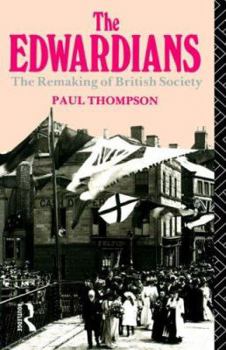The Edwardians
Select Format
Select Condition 
Book Overview
Everyone who lived during the reign of Edward VII was an Edwardian, not merely the rich, the literary or the scandalous. In this classic work, Paul Thompson records the life stories of some five hundred Edwardians born between 1872 and 1906 in a pioneering use of oral history, which captures a unique record of their times. Domestics, labourers, skilled and semi-skilled workers, professionals and high society men and women describe their work, their families, their politics and their leisure. The Edwardians establishes and describes the most important dimensions of social change in the early twentieth century: class structure, gender distinctions, age distinctions - urban and rural - and regional differences. It also evaluates the forces for social change in the period: economic pressures, religious and political conviction, feminism and socialism, patriotism and the war, to reveal how near and how far Edwardian society was to revolution in this time of critical social change. By giving a voice to the contribution and experience of ordinary people, Paul Thompson brings the Edwardian era vividly to life. This new edition, is substantially revised and includes a new chapter on Identity and Power, to take into account major historiographical and social changes since its publication in 1975. It has new photographs and an up-to-date bibliography.
Format:Paperback
Language:English
ISBN:0415061148
ISBN13:9780415061148
Release Date:November 1992
Publisher:Routledge
Length:384 Pages
Weight:1.57 lbs.
Dimensions:0.8" x 5.5" x 8.5"
Customer Reviews
1 rating
An illuminating study of Edwardian society
Published by Thriftbooks.com User , 17 years ago
For Britons, the first decade of the 20th century was one of great change. Traditional concepts of age, class, and gender faced increasing challenge, and the response ultimately transformed British society. In this book, Paul Thompson analyzes the changes British society underwent during those years. Using hundreds of interviews with people who lived during that era, he seeks to chart the lives people lived during that time, and what those lives can tell us about the evolution of British society during those years. To achieve this end, Thompson divides his study into four parts. The first covers what he terms the "dimensions of inequality,' considering those elements of age, wealth, and circumstance that defined the lives of men and women during that time. The second section, titled "Edwardians", recounts the lives of a dozen people from across the social stratum, ranging from the wealthy to those mired in poverty. From there he describes the social, economic, and political elements that were changing the lives of the Edwardians, from the suffrage movement to the onset of the First World War. Finally, he concludes with a look at how these transformative forces shaped the lives of the people, from their family dynamics to their quality of life. Taken together, these elements combine to provide an illuminating portrait of life in Edwardian Britain. Through his judicious combination of interviews and statistics, Thompson provides, a well-rounded examination of the people of the time and the changes they underwent. What makes the book especially worthwhile is his use of the interviews to breathe life into the people, as the individuals he singles out give definition and form to what otherwise could be just an anonymous mass. It is this which has helped to make this path-breaking social history such an enduring work, one that rewards reading for anyone interested in the people of the era.





